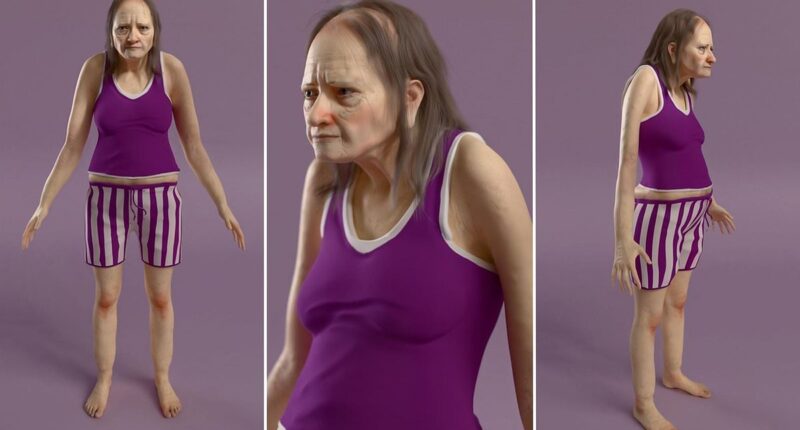A grotesque digital model shows reveals what humans could look like in 2050 if we don’t start getting enough shut-eye.
‘Hannah’, a collaboration between Bensons for Beds and sleep specialist Dr. Sophie Bostock, explores the effects on our bodies when we sleep for only six hours per night.
Hannah, a 45-year-old Brit from the future, has chronic back pain, thinning hair, sagging skin, swollen legs and red, baggy eyes.
She also suffers from thinning muscle in the arms and legs and is increasingly prone to flu due to a weak immune system.
Due to our hectic modern lifestyles and an obsession with smartphones well into the small hours, people may be losing more sleep than ever.
So by 2050, sleep deprivation will cause a plethora of exaggerated chronic health issues like the ones Hannah suffers from.
Generally, experts recommend adults sleep between 7 and 9 hours a night – and adults who sleep under 7 hours are more at risk of health issues.
According to a survey this year, the average Brit gets just six hours and 20 minutes of sleep a night.


Bensons for Beds and sleep expert Dr Sophie Bostock have predicted what our bodies could look and feel like by 2050 if we continue to be sleep-deprived

Hannah suffers from chronic back pain, thinning hair, sagging skin, swollen legs, baggy eyes and muscle atrophy (thinning of muscle mass) in the arms and legs
Hannah’s design has been based on 19 research papers in academic journals published since 2010 looking into effects of sleep loss on the body.
‘Hannah is a thought-provoking illustration of the holistic impact that sleep has on maintaining overall health,’ said Dr Bostock.
‘Many of us don’t realise that haphazard daily routines and lack of sleep interfere with our circadian rhythms, the 24-hour cycles which control our physiology.’
Fortunately, research into the importance of consistent, good quality sleep for health and wellbeing has accelerated in the last few decades, according to the academic.
Studies show that prolonged sleep deficiency can put you at a higher risk for conditions that may impact the heart – including obesity, heart disease and Type 2 diabetes.
MailOnline takes a closer look at all of Hannah’s terrible ailments – and how you can avoid looking like her by 2050.
BULGING TUMMY
Hannah represents a 45-year-old in 2050, which means she is currently a 20-year-old who is starting on her damaging journey of sleep deprivation.


She also has short-term and long-term memory loss and a lowered immune system, making her more vulnerable to respiratory infections like the common cold and flu
In 2050, a lack of sleep has made Hannah feel too tired to exercise and over time, she has stopped working out, leading to significant weight gain around her tummy.
What’s more, restricted sleep has affected both Hannah’s ‘leptin’ and ‘ghrelin’ hormones, which control feelings of hunger and fullness.
Without enough sleep, your brain reduces leptin (which your body releases to help it maintain your normal weight) and raises ghrelin (which is an appetite stimulant).
The flux of these hormones could explain nighttime snacking or why someone may overeats later in the night.
MEMORY LOSS
Lack of sleep affects a small part of the brain called the hippocampus, which is key for making new memories.
During sleep, your brain forms connections that help you process and remember new information – a process called ‘consolidation’.
Sleep offers ‘optimal conditions’ for consolidation by providing periods of reduced ‘external stimulation’ – in other words the demands of waking life.
Also, sleep increases levels of neurotransmitters – the chemicals that allow neurons to communicate with each other throughout the body.
So Hannah’s lack of sleep means she has less time for these connections, negatively impacting both her long-term and short-term memory.

According to a survey this year, the average Brit gets just six hours and 20 minutes of sleep a night (file photo)

Lack of sleep affects a small part of the brain called the hippocampus (highlighted in this digital render) which is key for making new memories
BAGGY SKIN AND EYES
It’s not called ‘beauty sleep’ for nothing, as a lack of shut-eye can seriously reduce the elasticity of our skin and make us look older.
When we sleep, we produce collagen, the protein that helps to keep the skin smooth and the primary building block of skin.
Sleep loss has also been linked with the body secreting more of the ‘stress hormone’ cortisol, which keeps us awake and alert.
Sleep deprivation also results in more fatigued, baggy-looking and red eyelids, as well as darker circles and wrinkles under the eyes, also thought to be due to loss of collagen.
SWOLLEN LEGS
Chronic sleep deprivation can raise levels of stress hormones like cortisol, which has been linked to lethal heart conditions.
Hannah has heart disease, prematurely affecting her life expectancy – one of the signs of which is swollen ankles.

The body releases the hormone cortisol from the adrenal glands, which are located on top of the kidneys
Heart disease slows blood flow around the body and causes fluid to build up in the feet, ankles and legs.
Also, heart failure makes the body less able to remove sodium, which also causes abnormal swelling.
CHRONIC BACK PAIN
Lack of sleep causes chronic back and shoulder pain for Hannah, while the pain prevents sleep – leading to a horrible ‘vicious cycle’.
During sleep, growth hormones and other chemicals are released that are essential for relieving pain and healing the body.
Also, a lack of sleep causes certain parts of the brain to be more receptive to pain signals – leading to the spiraling vicious cycle.
Sleep loss is also a cause of muscle atrophy – thinning of muscle mass – because it impairs the production of hormones involved in muscle-building.
Living on empty day in and day out has caused Hannah to get muscle atrophy with her arms and legs shrinking in size and shape.

Alopecia is the general medical term for hair loss. It is usually most noticeable on the scalp, but it can happen anywhere on the body
HAIR THINNING
Chronic poor sleep has meant that Hannah has gradually developed hair loss, known as alopecia, which could lead to total baldness.
Sleep deprivation is thought to hinder blood circulation to the scalp, depriving hair follicles of essential nutrients and oxygen needed for healthy growth.
Other than getting seven to nine hours of sleep per night, tips to avoid looking like Hannah include getting up at the same time every day – even at weekends.
Also, we should get at least 150 minutes of moderate exercise or 75 minutes of vigorous exercise per week, drink plenty of water, use a comfortable and supportive mattress, and spend as much time exposed to sunlight during the day as possible.
‘Hannah is a worst-case scenario prediction of what could happen to somebody if they do everything badly in terms of poor sleep routine and poor mattress support,’ said Lisa Richards, marketing director at Bensons.
‘Of course, she doesn’t represent all Brits, but the reason we wanted to create this model was to make people think more carefully about their overall sleep experience.
‘Using this visual makes it easier for people to identify with the issue and the key signs.’

















